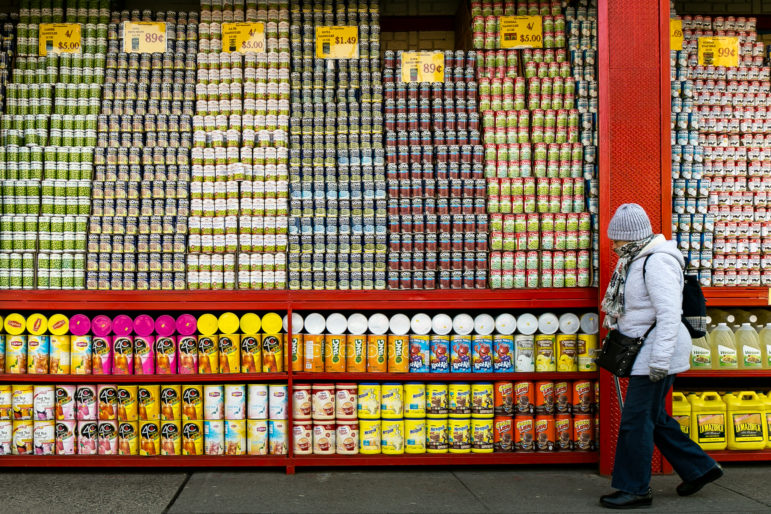
City Hall Announces Near-Elimination of Benefits Case Backlog As Challenges Persist
While advocates who specialize in public benefits have called for these backlogs to be cut, they say New Yorkers who rely on cash and food support are not yet out of the woods.
Adi Talwar
A supermarket in Inwood.
Mayor Eric Adams’ administration on Monday announced significant progress toward eliminating its backlogs of cash and food assistance cases, ahead of a court-ordered deadline of March 31.
Yet while advocates who specialize in public benefits have called for these backlogs to be cut, they say New Yorkers who rely on this support are not out of the woods, and continue to have a hard time with their applications, despite an overall increase in recipients.
For example, attorneys in court with the administration say they plan to explore possible connections between the decreased cash assistance backlog and a surge last year in such applications being denied for procedural reasons—mostly for failure to complete a mandatory phone interview, which users say can be difficult due to lengthy wait times.
“We can certainly be pleased with them meeting their deadlines and also simultaneously concerned that more people are being denied and that they’re not maintaining a phone system that’s accessible,” said Abby Biberman, associate director of the Public Benefits Unit at New York Legal Assistance Group (NYLAG).
As of Feb. 29, the Department of Social Services (DSS) had just 1,154 overdue applications and recertification requests from New Yorkers seeking cash assistance to cover rent and other needs—a share of whom are also seeking food aid—down from a peak of 46,000 in July.
Among those only seeking Supplemental Nutrition Assistance Program (SNAP), or food stamps, the backlog was 411 cases by the end of February, down from 4,000 last summer. SNAP-only cases are processed on a separate track from their cash assistance counterparts and have been less delay-plagued overall.
Under federal and state law, all SNAP and cash assistance applications and recertifications must be processed by the Human Resources Administration (HRA), part of DSS, within 30 days. Anything pending beyond that threshold is considered delayed.
Delayed processing can have serious consequences for applicants—from hunger to missed rent payments that can put families at risk of eviction.
On Monday, DSS attributed the reduced backlog to streamlined recertification processes, increased staffing—including close to 1,000 new workers in the past year— and changes to the mandatory interview process for cash assistance recipients.
While SNAP-only applicants have had an on-demand phone line for interviews since 2015, cash applicants had to conduct interviews in-person until the pandemic hit. Initially, these applicants had to wait for the city to call. But in April 2023, HRA began phasing in on-demand interviews for them.
“As a result of technological enhancements, investments in staffing, and strategic process changes, DSS is on track to eliminate backlogs impacting processing delays for cash assistance and SNAP benefits, and the agency is better positioned to handle unprecedented caseloads in the future,” DSS Commissioner Molly Wasow Park said in a statement.
The pandemic prompted a surge in demand for cash assistance, according to DSS, and the number of people receiving cash aid is now 510,000, up 25 percent from the beginning of the Adams administration. About 1.73 million New Yorkers receive SNAP, including many cash recipients.
Monday’s backlog data is distinct from DSS’ timeliness rate, most recently reported for the months of July through October of 2023. During that period, just 14.3 percent of cash assistance applications were processed on time, alongside 41.6 percent of SNAP cases (including SNAP-only and those associated with a cash assistance case).
“While it’s positive the administration reduced HRA’s extensive backlog of SNAP and cash assistance applications as part of a court ordered process, it is the failure to meet the requirement that these benefits are processed on-time that must also be addressed,” said Deputy Council Speaker Diana Ayala in a statement Monday.
DSS stressed that the most recent timeliness data encompassed the summer months when the agency was still experiencing peak backlogs.
Meanwhile, benefits applicants and advocates continue to report issues with HRA’s phone lines—both the InfoLine, which people can call for general information, and the interview lines.
“Across the board we’ve been continuing to see people having significant issues with the process in general, in terms of being able to complete interviews, [and] being able to get their recertifications processed,” said Helen Strom, benefits and homeless advocacy director at the Safety Net Project at the Urban Justice Center.
In January, City Limits reported that cash assistance rejections for failure to complete an interview made up 45 percent of all denials in the third quarter of 2023, exceeding 43,000.
For comparison, in three quarters-worth of data available before the pandemic, interview-related denials absent a scheduled appointment made up no more than 5 percent of the total.
In a June court filing, Jill Berry, first deputy commissioner at DSS, described plans for a computer program to more expediently reject a “cohort” of cases in which applicants fail to complete their interviews within 30 days, despite receiving reminder notices—what she called a “significant contributor” to the case backlog.
“We don’t know exactly the relationship between [the denial surge] and the data released this morning, but it is something we want to be cautious about and continue to investigate,” said Emily Lundgren, a staff attorney at the Legal Aid Society, on Monday.
Along with Biberman of NYLAG, Lundgren is representing benefits recipients in the federal lawsuit Forest v. City of New York. A preliminary injunction in that case set DSS’ backlog-clearing deadlines.
Eliminating the backlog was just one, preliminary objective of the lawsuit, according to Lundgren and Biberman. Their team is still collecting discovery from the city, and plans to explore possible issues with the interview process, as well as how DSS accepts and tracks documents that applicants must submit along with their applications.
According to DSS, the shift to online application processes during the pandemic made it easier for New Yorkers to start the application process, resulting in more applications overall and more incomplete applications that are ultimately denied.
But advocates stressed that, in their experience, applicants seldom drop an application once they begin the process, as the benefits they are seeking are needed to feed their children, and buy necessities like toothpaste and school supplies.
“I don’t think it’s a process you’re just going to begin and engage with without the determination to follow through,” Lundgren said.
To reach the reporter behind this story, contact Emma@citylimits.org. To reach the editor, contact Jeanmarie@citylimits.org
Want to republish this story? Find City Limits’ reprint policy here.
The post City Hall Announces Near-Elimination of Benefits Case Backlog As Challenges Persist appeared first on City Limits.


